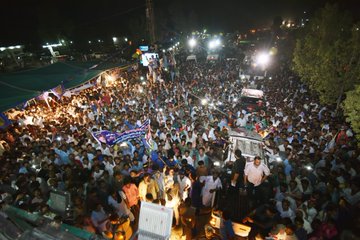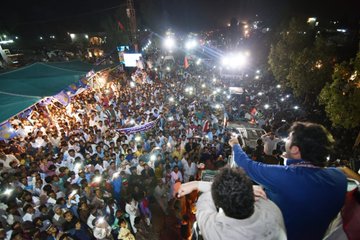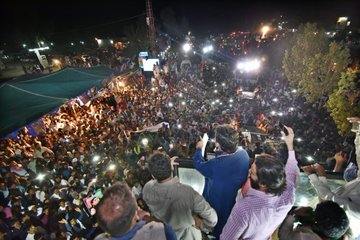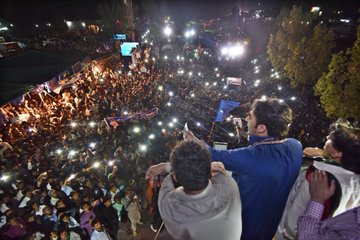M WAQAR..... "A man's ethical behavior should be based effectually on sympathy, education, and social ties; no religious basis is necessary.Man would indeed be in a poor way if he had to be restrained by fear of punishment and hope of reward after death." --Albert Einstein !!! NEWS,ARTICLES,EDITORIALS,MUSIC... Ze chi pe mayeen yum da agha pukhtunistan de.....(Liberal,Progressive,Secular World.)''Secularism is not against religion; it is the message of humanity.'' تل ده وی پثتونستآن
Wednesday, July 4, 2018
US issues travel alert for Pakistan over typhoid superbug outbreak Save
An outbreak of drug resistant typhoid in Pakistan has led United States health officials to issue a travel alert for the country.
America's Centres for Disease Control and Prevention (CDC) has said anyone heading to Pakistan or anywhere else in South Asia should take extra care with food and water and get a typhoid vaccination.
The CDC said the level two alert had been triggered by an ongoing outbreak of extensively drug-resistant (XDR) typhoid fever in Pakistan that does not respond to most antibiotics. As it has spread through the country, at least four people have died and around 800 have become ill, but travellers have also been affected. One infected traveller returned to the UK and two more returned to the US.
The CDC said: “All travellers to Pakistan are at risk of getting XDR typhoid fever. Those who are visiting friends or relatives are at higher risk than are tourists and business travellers.”
Typhoid, caused by Salmonella typhi bacteria, is highly contagious and spreads by contaminated food and water. Areas with poor sanitation are worst affected.
Symptoms include fever, stomach pain, headache and constipation or diarrhoea. If left untreated, it can kill. Each year there are an estimated 21 millions cases worldwide, with more than 200,000 deaths.
Health officials in Pakistan are starting vaccination campaigns in the worst affected areas, while US officials have “increased efforts to quickly interview and test samples from patients with suspected typhoid fever”, the CDC said Antibiotic resistance is a growing problem in lower and middle-income countries such as Pakistan and India, where drugs are poorly regulated and it is easy to buy antibiotics over the counter.
There have also been reports of superbugs in countries such as Yemen and Syria, where the health infrastructure has been damaged after years of unrest. A spokesman for the UK's Foreign and Commonwealth Office added: “The FCO keeps Travel Advice for Pakistan – and all countries – under constant review, and this update reflects the latest understanding of the risks faced by British nationals.
“We encourage British visitors to check FCO Travel Advice fully before travelling.”
Typhoid | Key facts
- Typhoid fever is a bacterial infection caused by the bacterium Salmonella entericaserovar Typhi
- It is highly contagious, and spreads in areas with poor sanitation when contaminated food or water is consumed
- Symptoms include fever, stomach pain, headache and constipation or diarrhoea. If left untreated, it can be fatal
- There are an estimated 21 million cases of the disease and 222,000 deaths every year
https://www.telegraph.co.uk/news/2018/07/04/us-issues-travel-alert-pakistan-typhoid-superbug-outbreak/
The assault on Pakistan media ahead of vote
By Ahmed Rashid
Imagine waking up in New York without the New York Times, newspaper kiosks shut down and hawkers off the streets.
That is what many Pakistanis have been feeling for months as Dawn - Pakistan's largest English-language newspaper - has disappeared from their breakfast tables.
A massive bout of censorship of TV channels, newspapers and social media is setting the stage for parliamentary elections on 25 July.
The media and some political parties are being micromanaged by an establishment alliance of the army and the judiciary, according to journalists and the former ruling party - the Pakistan Muslim League - and its leader Nawaz Sharif, who was prime minister until being ousted last year on corruption charges and barred from politics.
The army and judiciary deny this.
Fall from grace
However, it is the battle between Dawn and the establishment that has drawn most attention.
Dawn is the unofficial newspaper of record - indispensable for businessmen, diplomats and military officers alike - and known for its influential editorials that affect Pakistan's image worldwide.
Moreover, Dawn has a particular reverence in the national psyche because it was established by Pakistan's founder Mohammed Ali Jinnah before Partition, when Muslims in British India had no voice to communicate with the colonial power.
Since then, Dawn has ironically long been viewed by many as the establishment paper.
No longer.
Dawn has faced intimidation, harassment of its journalists, a ban on hawkers distributing the newspaper in military cantonments in every city in the country, cable operators told to take its TV channel off air, and massive cuts in revenue as advertisers are warned not to promote their goods in Dawn.
Last year, in the province of Balochistan, the newspaper was unavailable for weeks on end.
Meanwhile, other media personalities have faced kidnappings, arrests and physical abuse by mysterious hooded men who no journalist dare name - but every journalist in the country is convinced belong to the military intelligence agencies.
But after maintaining months of silence as to what it has endured, or what exactly the military's complaints are, Dawn recently published a frank and stinging editorial.
The editorial describes its important, factual reporting about the serious rift between civil and military authorities during the Nawaz Sharif government, which had infuriated the military, and Dawn's insistence on protecting the sources for its stories - a basic element of media ethics worldwide.
The editorial states that "a campaign of disinformation, libel and slander, hate and virtual incitement to violence against Dawn and its staff has necessitated placing certain matters on record".
It added that elements "within or sections of the state" are not upholding constitutional freedoms.
Dawn said it has been under attack since late 2016, but with "greater intensity" since May this year.
Last year, the largest Urdu-language newspaper Jang and its sister TV news channel Geo were subjected to such massive financial pressures and intimidation that they could not pay their staff for three months.
Unlike Dawn, their senior editors appear to have reached some kind of compromise with the military.
Even more targeted are bloggers on social media who write what the army describes as anti-state propaganda.
Meanwhile, the military frequently and with some vehemence denies that it interferes with the press, that it is determined to safeguard a free and fair election on 25 July - although it does admit to monitoring social media commentary.
Defiance by the establishment against both civil society at home and the international community seem to be the order of the day.
Just hours after Pakistan was placed on the Financial Action Task Force (FATF) grey list for failing to act against terror financing from its soil, an extremist leader listed on Pakistan's own terror watch list had his name removed and his party allowed to contest the elections.
Mohammed Ahmed Ludhianvi, head of the Ahl-e-Sunnat Wal Jamaat, a violent sectarian group known for killing Shias in Punjab, is now free to take part in politics.
His group - having adopted another name - has already registered dozens of candidates to stand in the polls.
Another well-known extremist group Lashkar-e-Taiba (or Army of the Faithful) is also fielding several hundred candidates for the elections, under a new electoral name.
Lashkar was declared a global terrorist group in 2014 by the UN, and its leader Hafiz Saeed has a $10m (£7.6m) bounty on his head.
Nobody admits to ordering these policy changes or justifying them. None of the multiple centres of power - the army, the judiciary, the interim government - have taken responsibility.
The press is too cowed to discuss the issue of why extremist groups have been given such protection and encouragement, when female bloggers like the well-known Gul Bukhari are being picked up in the streets of Lahore.Much of the micromanagement that is going on in the elections has the same mysterious and unknown quality as to who is conducting it and why it is happening.
Pakistanis have a long way to go before they can comfortably read Dawn at breakfast every morning while journalists do not face harassment and intimidation for reporting the facts.
Banned Pakistan Party Plans to Contest Elections
Madeeha Anwar
As Pakistan prepares for general elections in a few weeks, the Milli Muslim League (MML), a banned militant group-turned-political party, says it will field hundreds of candidates across the country under the umbrella of Allah-O-Akbar Tehreek (AAT), an old Islamist political party.
MML, established in August 2017, joined hands with AAT after Pakistan's Election Commission (ECP) rejected MML's request for registration last month.
"Getting into politics is the right of every Pakistani, and no one can be denied their basic, fundamental right. That's why we have decided to participate under the umbrella of Allah-O-Akbar Tehreek in the upcoming elections," MML spokesman Ahmad Nadeem Awan told VOA.
The ECP first rejected MML's request to be recognized as a political party last year, after Pakistan's interior ministry reached out to ECP and accused MML of serving as a front organization for Jamaat-ud-Dawa (JuD).
JuD is a banned militant group — the U.S. and U.N. have designated it terror organization — with ties to Hafiz Saeed, a U.S.-designated global terrorist accused of being the mastermind of the 2008 Mumbai terror attacks that killed 160 people, including six Americans.
The U.S. State Department imposed sanctions on MML in April and labeled its leadership as terrorists.
Court's intervention
In March, the Islamabad High Court instructed the election commission to re-evaluate its decision about MML. The electoral body again rejected MML's registration request.
Awan, the MML spokesman, criticized ECP's decision, saying it had denied the group a fundamental right.
"Our right to register at Pakistan's electoral body was denied twice despite the ruling by the Islamabad court. But this will not stop us from participating in the elections," Awan said.
Some experts in Pakistan view MML's alliance with AAT as "alarming" and say it will reinforce allegations that Pakistan is unable or unwilling to curb militant groups' activities.
"Disappointing and very alarming — allowing MML to participate under some other political platform will only add to the global pressure and criticism on Pakistan regarding cracking down on militant groups," retired Lieutenant General Talat Masood, a prominent defense and security analyst, told VOA. "Don't forget, we have just been added to FATF's terror watch list, and there is a possibility of going on the blacklist in the coming months."
Last week, the Financial Action Task Force, a global financial watchdog, placed Pakistan on its terror watch list for its alleged failure to address terror financing and money laundering in the country.
Zahid Khan, a leader of the Awami National Party and a former senator, said MML's ability to run in the elections pointed to the failure of the state and election commission, especially when election officials were warned against allowing militant groups to run for election.
"The political parties in a meeting with ECP last month clearly expressed their concerns that militant-turned-political parties must not be allowed to contest the elections at any cost. It is against the constitution and the stance that the government has taken in the past few months on MML," Khan said.
260 candidates
260 candidates
MML is reportedly aiming to field 260 candidates to participate in the state and provincial elections. Seventy-nine candidates will run for the national assembly. Another 181 candidates will seek seats in provincial assemblies.
Saeed's son and son-in-law are among the MML's chosen candidates. Thirteen women also are running on MML's behalf.
"We have chalked out our strategy on motivating the voters to come out and cast their votes for AAT. It's unfortunate that we have to run the elections under another political party, but what is important is we will be contesting the elections," Awan said.
#AwamPukareyJeayBilawal - 'Help us win so we can resolve your issues,' says Bilawal in rally through Sindh
As the Pakistan Peoples Party's (PPP) election campaign-related convoy trooped through major cities of Sindh, the party head addressed potential voters and asked them to help him win "so we can resolve your problems".
PPP chairperson Bilawal Bhutto Zardari travelled in his electoral rally through the province, en route to Nawabshah, and meeting and greeting supporters, party workers, and admirers in Hyderabad, Tando Adam, Hatri Bypass, Matiari, Hala, and Sanghar.
While speaking to the party workers and potential voters at various points during his motorcade, the PPP chief, referring to the people claiming that no infrastructure work was done by his party, said: "Who made the Nawabshah Road?"
"No government, in the history of Sindh, has done more work in the province than that under Qaim Ali Shah and Murad Ali Shah," he stressed.
Listing down the promises to people for if and when his party comes into power, Bilawal said he would commence a programme to reduce poverty throughout the country.
https://www.geo.tv/latest/201792-bilawal-in-sindh
#AwamPukareyJeayBilawal - #PPP - Bilawal Bhutto draws huge crowds during election campaign
Bilawal Bhutto Zardari, the 29-year-old son of late Benazir Bhutto has taken to the streets to claim the position held previously by his mother and grandfather Zulfikar Ali Bhutto- the Prime Minister of Pakistan.
From the pictures on his Twitter handle, it seems like he has been welcomed effusively by large crowds in several parts of Sindh province.
Bilawal kick-started his campaign for the General Elections in Paksitan from Sindh on Sunday.
The Pakistan Peoples Party (PPP) chairman on Wednesday took to Twitter to promise implementation of farmer friendly schemes, once his party comes to power following the General Elections on July 25.
Bilawal said that his party will introduce schemes such as the 'Kisaan Card' and 'Bhook Mitao' in a bid to end poverty.
"I promise the people of Pakistan that after coming to power, the Pakistan Peoples Party will introduce people friendly schemes like the Kisaan Card and Bhook Mitao," Bilawal tweeted.
From the pictures on his Twitter handle, it seems like he has been welcomed effusively by large crowds in several parts of Sindh province.
Bilawal kick-started his campaign for the General Elections in Paksitan from Sindh on Sunday.
The Pakistan Peoples Party (PPP) chairman on Wednesday took to Twitter to promise implementation of farmer friendly schemes, once his party comes to power following the General Elections on July 25.
Bilawal said that his party will introduce schemes such as the 'Kisaan Card' and 'Bhook Mitao' in a bid to end poverty.
"I promise the people of Pakistan that after coming to power, the Pakistan Peoples Party will introduce people friendly schemes like the Kisaan Card and Bhook Mitao," Bilawal tweeted.
میں پاکستان کی عوام سے وعدہ کرتا ہوں کے حکومت میں آنے کے بعد پاکستان پیپلز پارٹی کی حکومت کِسان کارڈ اور بھوک مِٹاؤ جیسے عوام دوست پروگرام متعارف کروائے گی۔ #NaushahroFeroze
"You are the people who have defeated Zia-ul-Haq and dictator Pervez Musharraf," Geo TV quoted Bilawal as saying.
However, a lack of coverage on his campaign by local broadcast media has not gone down well with his aides.
"July 4th 2018. Not surprised by the media blackout, the same media always claim #PPP is losing its ground in #Sindh. I think we should let the people of Sindh speak for themselves ?? #PeoplesVoice #PeoplesChoice #SingingLoudAndClear #WazirEAzamBilawal #PPP2018," tweeted Bilawal's sister Bakhtawar Bhutto Zardari.
Bilawal started his campaign on Sunday from Sindh's capital city of Karachi, where his convoy was pelted with stones. Although Bilawal escaped unharmed in the attack, the window of his car was smashed by the miscreants.
Since then he has visited Hyderabad, Thatta, Tando Jam, Hatri Bypass, Mithiani, Hala, Nawabshah, Moro, Kazi Ahmed and Sanghar in Sindh.
Upon completion of his campaigning in Sindh, Bilawal is slated to continue his campaign in Punjab and Khyber Pakhtunkhwa provinces.
Pakistan is slated to hold the general elections on July 25. Bilawal is contesting from NA-246, Karachi.
https://www.aninews.in/
PPP Chairman Bilawal Bhutto Zardari continued his campaign in Sindh with another eventful day on Wednesday. From Sakrand to Moro to Noushehro Feroze to Ranipur to Pir Jou Goth, the PPP Chairman will end his day in Sukkur later tonight
Pakistan People’s Party (PPP) Chairman Bilawal Bhutto-Zardari continued his campaign in Sindh with another eventful day on Wednesday. From Sakrand to Moro to Noushehro Feroze to Ranipur to Pir Jou Goth, the PPP Chairman will end his day in Sukkur later tonight.
PPP supporters welcomed Chairman Bilawal with “Na Pir jo, Na Mir jo, Vote Benazir jo” (Not any Pirs, Not any Mirs, our vote is only Benazir’s) slogans everywhere he went. Chairman Bilawal said that he is being challenged by political parties that have not even presented their party manifestos so far.
“How can Taliban Khan and the one who is asking why he was ousted contest against us?”, said Chairman Bilawal Bhutto.
Addressing his supporters, Chairman PPP remarked that the people of Sindh defeated terrorism and dictators. “You are the ones who defeated General Zia and General Musharraf.” He also criticised the Judiciary for meddling in the domain of elected governments. “Judiciary is not responsible for the construction of dams; it is the responsibility of the governments. The PPP has always raised the issue of water scarcity and we will resolve it.” He highlighted how the PPP government in Sindh had built many small dams across the province.
Chairman PPP said boycotting or delaying the elections is not an answer to any problem as such measures would only weaken the democratic process in the country.
https://mediacellppp.wordpress.com/2018/07/04/ppp-chairman-bilawal-bhutto-zardari-continued-his-campaign-in-sindh-with-another-eventful-day-on-wednesday-from-sakrand-to-moro-to-noushehro-feroze-to-ranipur-to-pir-jou-goth-the-ppp-chairman-will-e/
Bhutto scion 'didn't choose this life' but campaigns to be Pakistan PM
By Saad Sayeed
His mother was assassinated on the campaign trail and his grandfather was executed by a military dictator, but that has not prevented Bilawal Bhutto Zardari from seeking the job they both held: prime minister of Pakistan.
His mother was assassinated on the campaign trail and his grandfather was executed by a military dictator, but that has not prevented Bilawal Bhutto Zardari from seeking the job they both held: prime minister of Pakistan.
“I didn’t choose this life, I didn’t actively go out and pursue it. My mother always used to say that she didn’t choose this life, it chose her. In the same way I feel like it applies to me,” Bhutto Zardari told Reuters, as he stood on the roof of his open-top, 20-foot-high bullet-proof bus. Asked if he is ever afraid while campaigning, he answered briefly: “No”. He then pivoted to discussing a “climate of fear” in the lead-up to the elections that some activists blame on Pakistan’s powerful military. In one of the first interviews since being named the PPP’s prime ministerial candidate, he also criticized fellow Oxford graduate and opposition leader Imran Khan - a potential coalition partner.
Flanked by supporters on either side of the single-lane highway, Bhutto Zardari was showered with rose petals as he waved to thousands of people who waited to catch a glimpse of the youngest of the political dynasty that many call the Pakistani equivalent of the Kennedys. Despite the feel-good feeling in the crowds, election time is always tense in Pakistan, which has been ruled by the military for almost half of the 70 years since independence.
The outgoing Pakistan Muslim League-Nawaz (PML-N) government has accused the military and courts of playing a role in the ouster of Prime Minister Nawaz Sharif last year and helping Imran Khan’s PTI political party.
Khan, a former cricket captain of Pakistan, denies the accusation and calls the PML-N a graft-ridden “mafia”.
And overshadowing all this is the fear that the election is being engineered by the “establishment”, a euphemism for Pakistan’s much feared military and intelligence top brass, along with some senior civil servants and judges.
The military has repeatedly denied that it interferes in modern-day politics. “I think that there is absolutely a history in Pakistan of an over-active role for our establishment and the Pakistan Peoples Party firmly believes that should not be the case,” Bhutto Zardari said, when asked about the military’s involvement in politics.
“There is absolutely a feeling that certain candidates are feeling pressurized, are feeling certain political parties are being supported in ways that they shouldn’t be,” he said. “I believe everyone should believe in the people of Pakistan, trust the people of Pakistan to make their own choices.”
POWER BROKER
Bhutto Zardari’s convoy started in the town of Thatta, the medieval capital of Sindh, and was later headed north to the Punjab and Khyber Pakhtunkhwa provinces, hoping to revive the vote base it lost in the 2013 polls, when it finished second.
A Gallup nationwide poll in March put his party’s popularity at 17 percent, with Khan’s PTI at 24 percent and Sharif’s PML-N at 36 percent.
One of the party’s challenges is overcoming the image of Bhutto Zardari’s father, former President Asif Ali Zardari. Some analysts and party insiders say numerous corruption allegations against Zardari could cost the party at the polls, where it will contrast with Imran Khan’s relentless anti-graft message.
Zardari spent 11 years in jail on charges of corruption and murder, but was never convicted. He has always maintained his innocence and remains a party leader and adviser to his son. Although Bhutto Zardari is campaigning to become prime minister, many political analysts believe the PPP may at best become a power broker if no party wins a clear majority, as seems likely. He has indicated he would be willing to join a possible coalition government, although he did not say whether he would prefer the PML-N or Khan’s PTI.
He said Khan’s socially conservative PTI was “peddling the politics of hate, of polarization, the politics of divisiveness”.
“It may win Imran Khan an election but it has disastrous consequences for the youth of Pakistan and for Pakistan’s society,” Bhutto Zardari said.
He has been quoted in local media as calling the PML-N “cruel rulers” and saying that it had “decided to eliminate the poor, and not poverty.”
Bhutto Zardari said his ambitions were not just about becoming prime minister, but bringing back the policies that were dear to his mother.
On the campaign trail, he frequently mentions her in his speeches.
“We have to keep B.B.’s promise. We have to save Pakistan,” he says in Urdu, the national language, using the initials by which his mother was commonly known.
“There is no greater sense of fulfillment in a son’s life than to feel like he is continuing with his mother’s incomplete missions,” he said.













